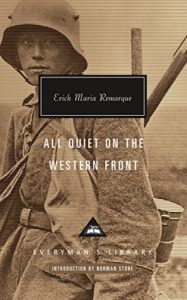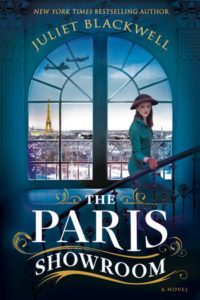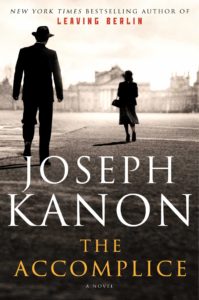If you caught the recent Netflix film All Quiet on the Western Front and wondered about the book it’s based on, don’t hesitate to get the handsome Everyman’s Library edition. You’ll see why it’s considered one of the greatest war novels every written and more than that, you’ll be amazed at how it doesn’t sound translated. The prose is that clear, that vivid, that compelling. Translation, bringing a book into another language and its culture, is an art and this version of the book is incredibly artful.
The story is simple and complex. Paul and his German schoolmates are basically bullied into signing up for the German army by their jingoistic teacher. However patriotic they are, life in the trenches changes them utterly.
Life and death aren’t topics to read about and discuss: they are both majestic and ephemeral. You can be killed at any minute by a sniper, an artillery shell, a mine–or crushed by a tank. Conversely, you can miraculously escape death by stepping out of a bunker for a smoke or an errand.
The fear, the tension, the horror of seeing people die in myriad grotesque ways are like an acid bath. The dark realizations hit him early and hard:
“We are no longer young men. We’ve lost any desire to conquer the world. We are refugees. We are fleeing from ourselves. From our lives. We were eighteen years old and we had just begun to love the world and being in it; but we had to shoot at it. The first shell to land went straight for our hearts. We’ve been cut off from real action, from getting on, from progress. We don’t believe in those things anymore; we believe in the war.”
Paul experiences one horror after another, loses friends, is wounded, has to kill or be killed, and one of the most amazing chapters of the book is the time he’s trapped for three days in a shell crater with a dying man. But there are also surprisingly moving and even comic moments of camaraderie as he and his fellow soldiers bond around incredible events that soon become ordinary.
The novel is short, fast-paced, devastating and seems oddly current, given the network of trenches that Russia has built in occupied Ukraine. Anyone interested in the history of WWI or amazing fiction should read this book. ★★★★★
Lev Raphael’s introduction to WWI was via a classic, The Guns of August, which he read one summer between sixth and seventh grade. He recently learned that his paternal grandfather, murdered at Auschwitz, fought in that war.



